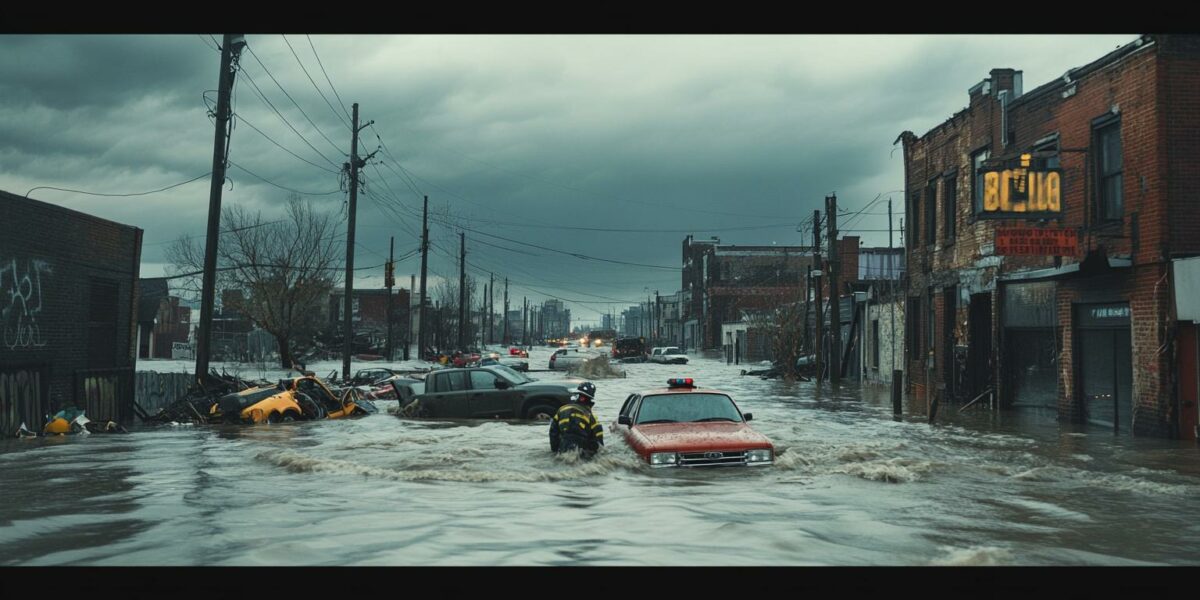Record-Breaking Flood Emergencies in the US
This year, the United States has faced an unprecedented number of flood emergencies, highlighting the significant impact of climate change. Over 91 flash flood emergencies have been declared, a startling statistic that underscores the extreme weather patterns emerging as our planet continues to warm.
Flash flood emergencies, the most severe of warnings, signify a dire threat to life and property. They have become more frequent, making up a small percentage of all flood alerts, but their increase indicates a growing trend of climate-induced disasters.
According to Kate Abshire, a hydrologist, “It’s the ultimate tool in our toolkit,” emphasizing the critical nature of these warnings. Such events have resulted in devastating losses both in human lives and financial resources, reshaping landscapes and communities.
The recent flooding in Roswell, New Mexico, exemplifies the extreme rainfall patterns scientists anticipate with climate change. The city experienced half a year’s worth of rain in just one day, transforming roads into torrents.
Understanding the Causes and Consequences
The intensification of rain events is attributed to a warmer atmosphere, capable of holding more moisture. This year alone, data shows that the Southeast has experienced concentrated areas of flash flooding.
Factors contributing to this phenomenon include:
- Fossil fuel pollution increasing atmospheric temperatures.
- Development near waterways exacerbating flood risks.
- Changes in natural water pathways affecting flood patterns.
“Extreme rain events have been happening more frequently,” states Astrid Caldas from the Union of Concerned Scientists. Such trends are anticipated to continue, posing a serious threat to communities worldwide.
Development in flood-prone areas amplifies these risks. As urbanization grows near rivers and mountainous regions, the potential for catastrophic flooding increases significantly.
Impact of Tropical Systems
This year, tropical storms have contributed significantly to flood emergencies. Hurricanes like Helene have unleashed record-breaking rainfall, with up to 30 inches in some areas, causing massive destruction.
Helene alone accounted for over 30 flash flood emergencies, surpassing last year’s total. Such storms are fueled by warm ocean waters, exacerbating their intensity and impact.
The Gulf of Mexico’s record temperatures have acted like rocket fuel for these systems, intensifying their effects. The combination of rising ocean temperatures and atmospheric warming is creating a new norm for extreme weather events.
“The past does not predict the future anymore,” warns Caldas. As climate change accelerates, the frequency and severity of these events will likely continue to rise.
Fire-to-Flood Disasters
The transition from fires to floods illustrates the interconnected nature of climate disasters. In New Mexico, wildfires damaged the landscape, and subsequent heavy rains led to flash floods, exacerbating the initial destruction.
Such disasters demonstrate the cascading effects of climate change. As the soil loses its ability to absorb water, floods become more severe, posing additional threats to affected regions.
This year, FEMA declared 45 flood-related major disasters, a testament to the increasing challenges faced by communities. These events are straining resources and highlighting the urgent need for effective climate solutions.
As temperatures rise, creating a potent mixture of conditions, the likelihood of such disasters will only grow, reshaping our understanding of climate resilience and adaptation.



DylanSeraphim0
It’s essential to shift towards renewable energy to reduce fossil fuel pollution. Time to act is now!
ariannaethereal5
With these trends, future generations might only know about dry land from history books. Depressing thought.
sadiedreamwalker7
The situation is dire, but we need actionable steps and not just warnings. What measures can individuals take?
aiden_velocity1
Does anyone else find it ironic that “Helene” sounds like “hell”? Because that’s what it feels like! 😂
olivefrost9
Great article! It’s scary how climate change is affecting us all. Thanks for highlighting this issue!
RyanOracle
Why aren’t governments doing more to prevent construction in flood-prone areas?
EastonWanderlust
Wow, half a year’s worth of rain in one day? That’s just crazy! 😲
LaurenLuminary
Is there any hope for reversing this trend, or are we just along for the ride now?